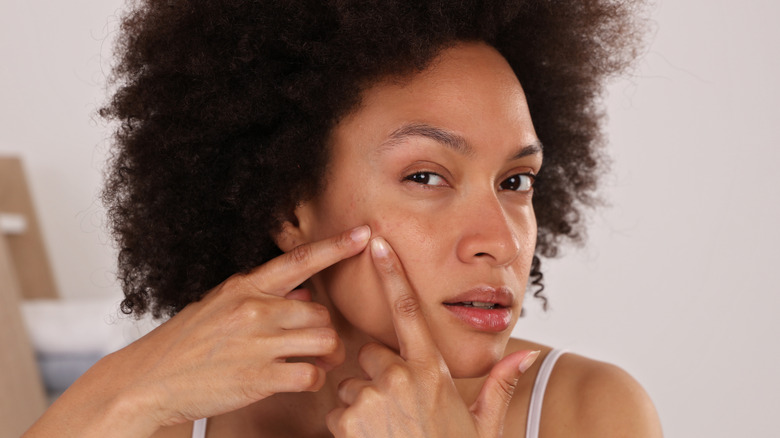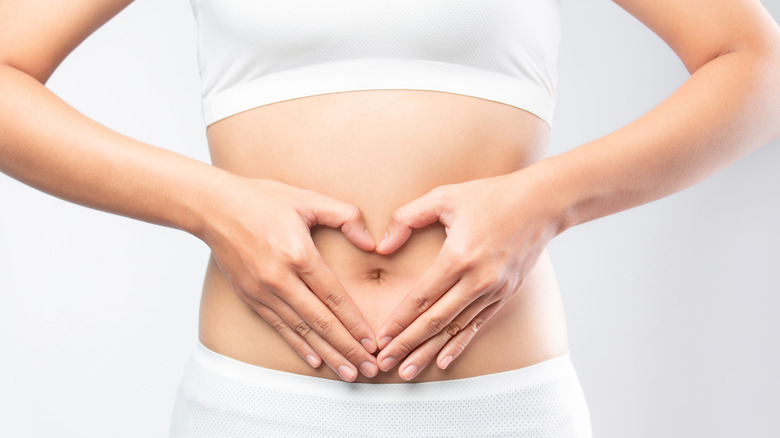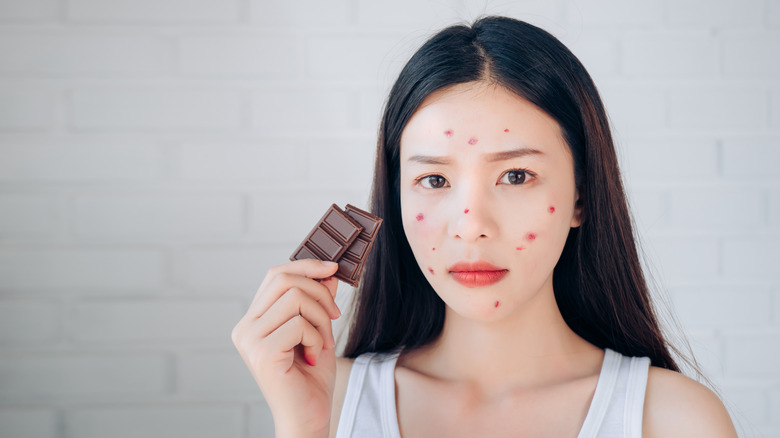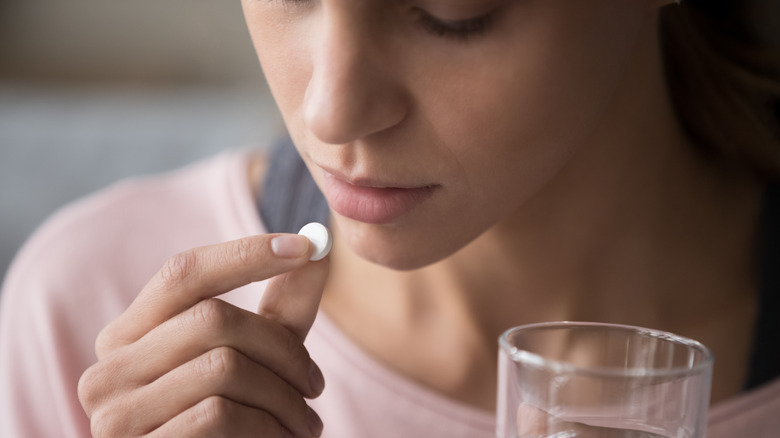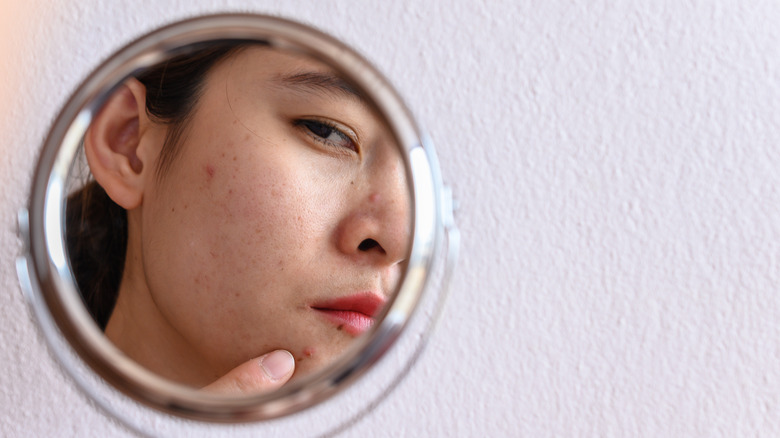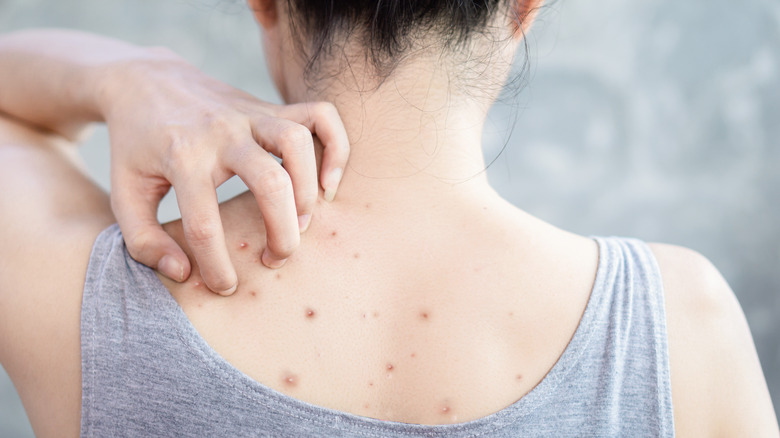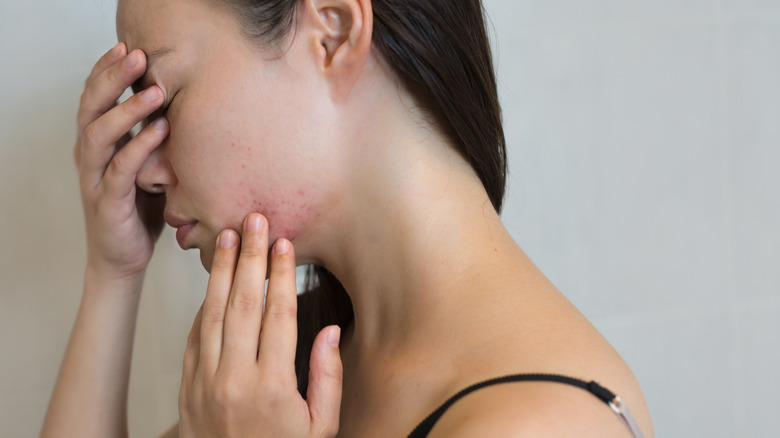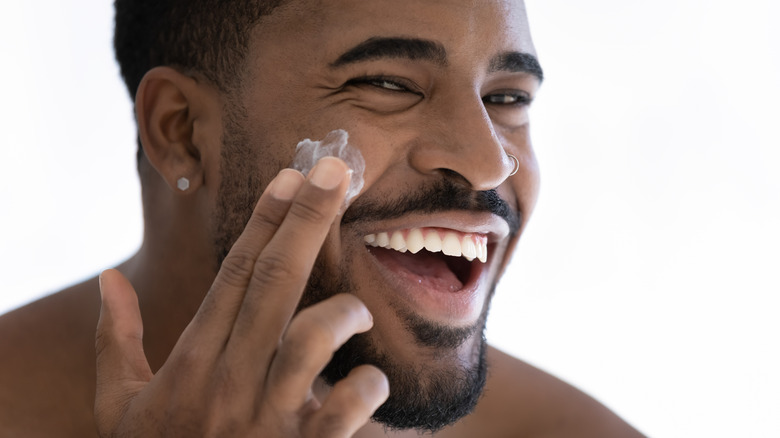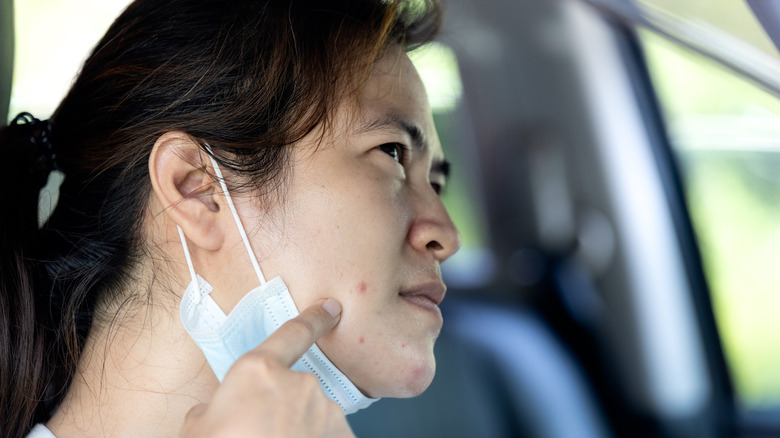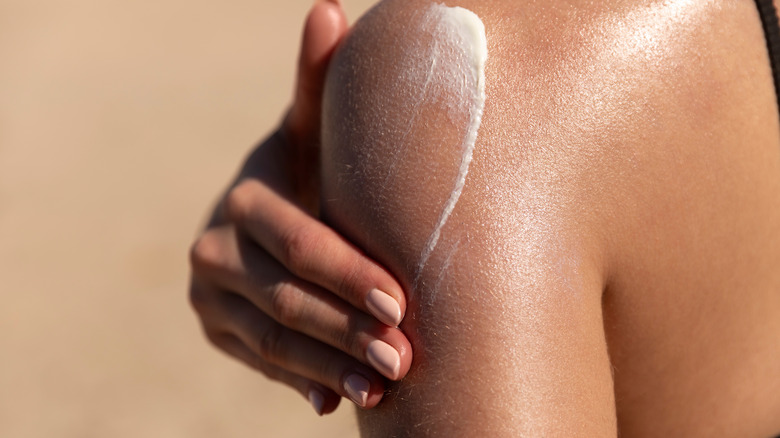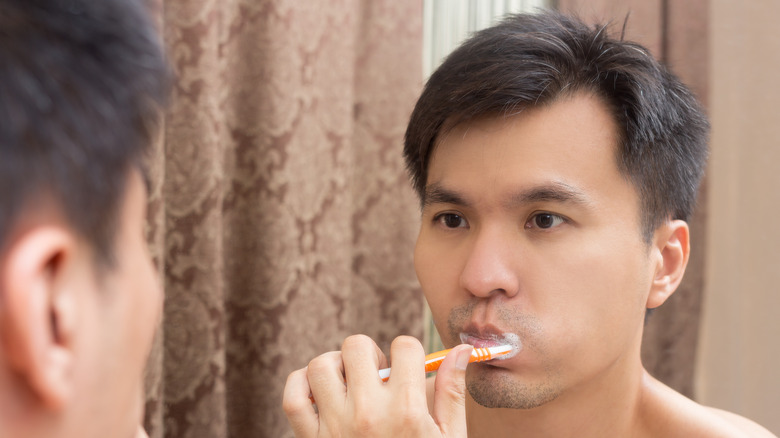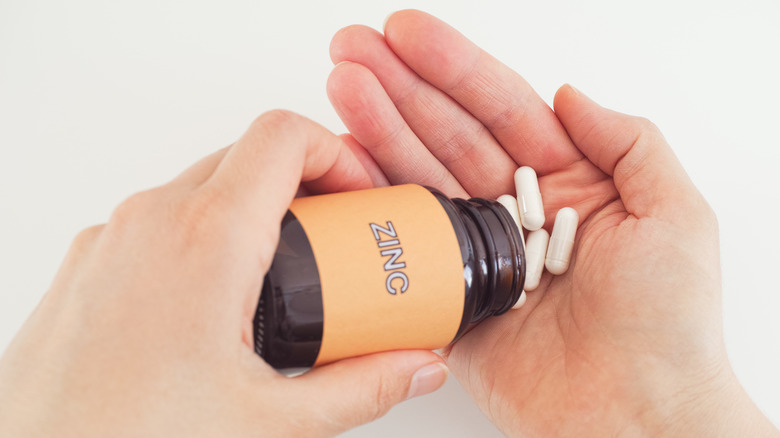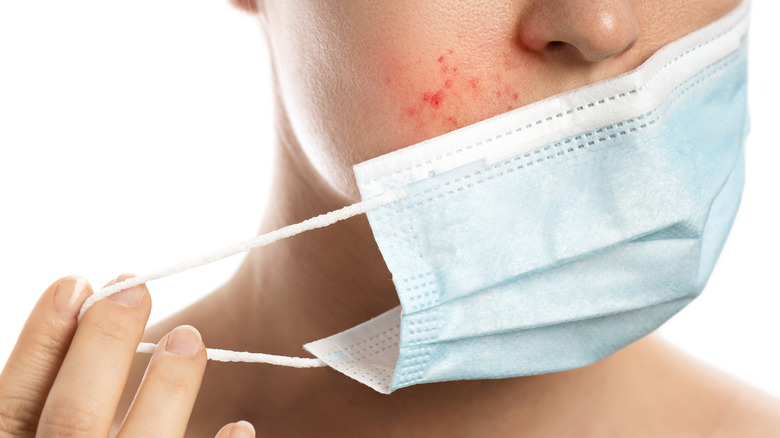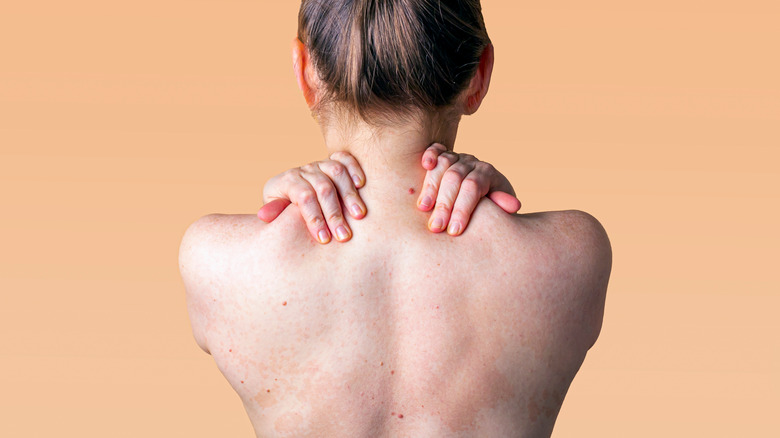Surprising Things Your Acne Can Reveal About Your Health
Your skin, the body's largest organ, is often deemed a window to your overall well-being. Each spot, bump, rash, and pimple are thought to tell a story about your health, signaling a plethora of issues from hormonal imbalances to dietary-related problems to dehydration or stress (via The Healthy).
Acne is a common skin condition that usually begins at puberty and goes away during the early 20s. But some people continue to experience acne throughout adulthood. This occurs when hair follicles and oil glands under the skin become clogged, causing zits and other abnormalities on the face and body to emerge, explained The Healthy. "Under certain circumstances, cells that are close to the surface (of the skin) block the openings of the sebaceous glands, and cause a buildup of oil underneath," Melissa Aardema, a licensed medical aesthetician, told the publication. "This oil stimulates the growth of bacteria, which live on everyone's skin and can very easily multiply and cause surrounding tissues to become inflamed."
There isn't known to be one single cause of acne — it's believed to develop from an interplay of various factors. But the type and location of your pimples may provide a clue as to what's going on with your body and what may be contributing to your flare-ups (via Reader's Digest). Read on to find out some common, yet surprising, things your acne is able to tell us about your health.
Your gut health is out of balance
There's been a burgeoning body of research evidence exploring the intricate relationship between the gut microbiota and skin, often referred to as the gut-brain-skin axis. "Both are important organs for keeping the body in a stable state and protecting against the invasion of infectious organisms," Aisling Dwyer, gut microbiome expert at OptiBac, told NetDoctor. "Often people with gastrointestinal illnesses such as inflammatory bowel disease have corresponding skin issues, which shows how closely linked gut health and skin health are."
Although a poor microbial environment in the gut is unlikely to be the only contributing factor, digestive issues are often present in people who develop acne, acknowledged Dr Dwyer. Specifically, it's hypothesized that "leaky gut syndrome" — which scientists also call "increased intestinal permeability" — could be a hidden cause of acne, as noted by NetDoctor. This condition may allow acne-generating bacteria to seep into the bloodstream.
When it comes to figuring out whether your gut health might be having a negative impact on your skin, it's down to trial and error, Dr. David Jack, skin care specialist, also told the publication. "If you have acne, it might be worth trying to increase your intake of prebiotic foods — the foods that the 'good' gut microbes like to eat — and also taking a probiotic supplement (i.e. the bacteria themselves)," he suggested.
Your stress levels are high
Studies continue to confirm that stress-induced pimples are a real thing. The phenomenon of "stress acne" refers to the outbreak or worsening of preexisting acne due to a psychological stressor, Allison K. Truong, dermatologist and fellow of the American Academy of Dermatology, told Health. Even women who've been successfully managing their hormonal acne with hormonal birth control can experience a sudden spurt in acne spots as a result of stress, Truong added.
While feeling stressed out may not be a direct cause of your acne, there are many different ways your emotional wellbeing can affect your health and wreak havoc on your skin. For instance, a 2018 literature review published in Frontiers in Psychology suggests that both insomnia and depression, which have a negative effect on stress levels, can aggravate acne by modifying our gut bacteria.
Chronic elevations in cortisol, a stress hormone best known for kicking off the "fight or flight" response (via Cleveland Clinic), can also compromise the immune system and its ability to fight off infections. Other hormones produced when we feel stressed include androgens, which have a similar effect as cortisol, binding to and stimulating the oil glands and hair follicles in the skin, the Cleveland Clinic revealed.
You're sensitive or intolerant to something you're consuming
There's strong evidence that our diet and skin health are intimately connected. While genetics plays an important role, what we put into our bodies can strongly influence our risk of developing skin problems, according to the American Academy of Dermatology Association. In particular, research findings show that high-glycemic foods like white bread and potatoes make our blood sugar levels rise quickly, causing inflammation throughout the body and stimulating excess sebum — both of which can spark breakouts.
A 2014 study published in Drugs in Dermatology points towards refined carbohydrates as being particularly problematic for some people, while other studies have found that cow's milk can exacerbate acne symptoms (American Academy of Dermatology Association).
When it comes to diet, experts say it's important to listen to your intuition and body to figure out which foods promote an inflammatory response and lead to spots (via The Healthy). Ultimately how your skin reacts to specific foods depends on your individual biology, which is why "there are people who eat a very poor diet and hardly ever experience breakouts or acne," JoElle Lyons-Lee, an aesthetician and founder of JoElle SkinCare, told The Healthy.
Certain medications can cause breakouts
Just as we might be intolerant to certain foods, the consumption of specific medications can yield acne flare-ups or acne-like bumps, also known as drug-induced acne (via DoveMed). For instance, drugs that affect hormones like contraceptives and hormone-replacement therapy sometimes cause breakouts in women due to a spike in testosterone levels (via WebMD). Athletes and bodybuilders that turn to anabolic steroids to gain muscle bulk have been known to develop cystic acne, as noted by WebMD. Researchers have also discovered a significant correlation between acne in men and oral corticosteroids, which can increase yeast proliferation in the hair follicles.
If drugs are the offender, a person's acne usually goes away upon stopping the medication. But most cases of acne aren't drug-related, according to Lisa A. Garner, a clinical professor of dermatology at the University of Texas Southwestern Medical Center, who told WedMD that drug-induced acne is "not common at all."
You have a hormonal imbalance
Adult acne affects both men and women. However, women are more likely to have it due to hormonal fluctuations associated with menstruation, contraception, pregnancy, and menopause, as reported by the American Academy of Dermatology. Some women will see a swing in their skin around the time of their period — the "monthly breakout" isn't a myth (via Verywell Health). Acne is also a common symptom of polycystic ovary syndrome (PCOS), an endocrine condition in women who have high levels of male hormones called androgens and small cysts in their ovaries, as corroborated by research findings.
Acne along the chin or jawline, in particular, is commonly attributed to hormone issues. This is consistently supported by research, including a 2016 article in Clinical Cosmetic and Investigational Dermatology, which revealed that breakouts on these parts of the face are likely to stem from a hormonal imbalance. According to ancient Chinese and Ayurvedic principles, the traditional technique of "face mapping" can help us identify the root cause of our acne spots based on their whereabouts, shedding light on any underlying health issues, (via Reader's Digest). Although the scientific research to support this as a legitimate diagnosis and treatment tool remains limited.
Working out is contributing to your acne
Exercise has long been lauded for its health benefits. When it comes to aiding skin health, working out increases blood flow and helps deliver oxygen and nutrients to the skin cells, which promotes collagen production and encourages new skin cell growth (via Healthline). But intense workouts also cause us to sweat, leading to a buildup of oil and dirt on the skin, which can create a bacteria-rich environment where fungal acne thrives, per Healthline.
"Acne due to physical activity can be related to repetitive pressure from tight clothing when exercising," Anjali Mahto, of the British Association of Dermatologists, told Patient. This might be why you're noticing an increase in spots on specific areas of your body after exercising like your back, shoulders, and buttocks. "Tight fabrics, sweat and heat can block hair follicles and create a warm, moist environment for bacteria to multiply in. This combination of blocked hair follicles and multiplying bacteria can lead to acne forming," explained Mahto.
You're not getting enough sleep
A lack of sleep is tied to various health problems, and research confirms that getting your beauty sleep isn't just a cliché. A 2019 study in the journal Clocks & Sleep showed that sleep deprivation and fatigue can make us feel stressed and expose our bodies to high levels of cortisol, a steroid that wears down the immune system. When the body's defense mechanism is weakened, it has a tough time protecting itself from toxins and repairing any damage caused to skin tissue and cells throughout the day.
"With significant stress, we get a release of a whole number of stress hormones such as catecholamines and neuropeptides," Dr. Ritu Gupta, a specialist dermatologist from Platinum Dermatology Skin Specialists, told Marie Claire, adding that, like cortisol, "these hormones cause an increase in sebaceous glands which increases oil production."
Pimples that surface across your forehead, in particular, indicate that you're not getting enough sleep, Dr. Amanda Doyle, a dermatologist at the Russak Dermatology Clinic in New York City, said to Health.
You need to change your skin care products
The sneaky ingredients in some of the skin care products you've been using may also be contributing to your acne woes. Some facial creams and hair products, for example, contain heavy oils that clog and irritate the pores, which is why people usually notice zits cropping up near their cheeks, hairline, and ears (via Health). Coconut oil has restorative properties due to its high concentration of antimicrobial fatty acids like lauric acid, which can kill the bacteria that feeds acne, but it can also clog the pores (via Verywell Health).
Products that contain sodium lauryl sulfate, a common foaming agent and oil-stripping surfactant, might also be an underlying trigger, Dr. Jeanine Downie, a cosmetic dermatologist, told Cosmopolitan. Surprisingly, other chemicals that can dry out the skin and multiply your spots like salicylic acid and benzoyl peroxide are found in acne treatment products themselves, Samantha Wright, a licensed aesthetician at the Dangene Institute, shared with Cosmopolitan.
What's more, some commercial laundry detergent brands are packed with fragrances and harsh chemicals that irritate the follicles of acne-prone individuals, sprouting blackheads and whiteheads (via acne.org). Sensitive skin types might be better off opting for unscented detergents.
Air pollution is irritating your skin
The pollution particles in the air can have an equally deleterious effect on the skin. A 2021 study published in the International Journal of Women's Dermatology underlined the direct link between acne and environmental pollution. The study author identified that acne cases were higher in cities with ambient air pollution and that symptoms generally worsened during periods of particularly bad air quality. The study noted a decline in vitamin E and squalene levels in the skins of those experiencing acne due to air pollutants.
While research is still in its early stages, many skin care experts consider the gunk in our environment as another acne-causing pest (via Refinery29). Luckily, there are certain protective measures we can take to shield ourselves from these tiny aggressors and their harmful effects. If you're living in an area with heavy air pollution levels, wearing a face mask can help block particles from penetrating into skin, licensed dermatologist Loretta Ciraldo, advised to Refinery29. Washing your face twice a day and maintaining a regular exfoliating routine can also go a long way, preventing breakouts in the long term, she added.
According to the face mapping belief, breakouts on the upper cheeks are linked to our lung health (via Healthline). Both smoking and breathing in toxic air can overwork the respiratory system, which is also responsible for acne.
The sun is triggering more oil production
There's a common skin myth that natural sunlight helps "clear up" and ward off acne. While a little sun exposure may feel good and can even be healthy, the sun can also be a key instigator of acne, kicking the sebaceous glands into overdrive and producing excess sebum (via Acne Intelligence).
"The sun's UV rays zap acne-causing bacteria, which is why pimples may clear up temporarily," dermatologist Jessica Wu explained to HowStuffWorks. However, the sun's ultraviolet rays also bolster inflammation, causing post-inflammatory hyperpigmentation (dark discoloration) and leading to more breakouts (via WebMD). A 2014 study in the Journal of Dermatology found that many people report a "summer aggravation" whereby humid environments and sweating heighten their symptoms.
People whose skin has seen prolonged sun exposure sometimes develop solar comedones (via Healthline). These manifest as small, bumpy, and flesh-colored papules, primarily on the cheeks, per Healthline. Solar comedones typically appear on middle-aged and older adults and are usually spotted on people who've spent years working an outdoor job, like building or farming. They can also be caused by frequent sunbathing in younger adults.
Your toothpaste may be the culprit
Dabbing toothpaste on your pimples as an acne cure is an old-school beauty hack that surprisingly still lives on today. It's hard to know where this solution came from, but most experts now agree that toothpaste is not a viable treatment for skin blemishes. And in fact, it can actually do more harm than good (via Healthline).
Toothpaste isn't meant to be used on the skin, Dendy Engelman, a dermatologist, told Oprah Daily, explaining that the ingredients in most brands — alcohol, baking soda, hydrogen peroxide, and more — can dry out and anger the skin, leading to peeling, burning, and further inflammation. Fluoride and sodium lauryl sulfate are also harsh chemicals often found in toothpaste, which can cause irritation (via Everyday Health). This may be why some people notice a surge of pimples pop up around the mouth (via Facing Acne). So, don't forget to wash away any dribbled-out toothpaste while brushing.
You could have a zinc deficiency
Although pimples don't commonly pinpoint a zinc deficiency, research has identified a correlation between acne and low serum zinc levels, including a 2014 study in the journal BioMed Research International. Another 2014 study, published in Cutaneous and Ocular Toxicology, showed that individuals with acne were deficient in zinc as well as vitamin E and A.
Zinc is a mineral that's found in various foods. It helps our immune system and metabolism function, and aids with healing wounds and infections (via Mayo Clinic). Most people get a sufficient amount of zinc in their diet, according to Medical News Today, but those with sickle cell disease or digestive disorders like Crohn's disease and ulcerative colitis tend to be at risk of having a zinc deficiency, as well as those with alcohol addiction and some vegetarians.
A 2014 literature review in the journal Dermatology Research and Practice showed that medications containing zinc have been used to successfully treat acne in some people, although evidence for their efficacy is generally mixed.
Your cellphone is taking a toll on your skin
Anything that consistently comes into contact with your face has the potential to contaminate your skin with acne-causing bacteria (via Reader's Digest). So frequently holding your cell phone to your ear and resting it against your cheek may just be the source of your zits. This is called "acne mechanica," Eric Schweiger, clinical instructor of dermatology at Mount Sinai Medical Center, told Everyday Health. "It happens to violinists around the chin and football players with the chin strap," he explained, ascribing it to the suffocation of pores and the friction caused by repetitive motions.
In a 2011 study, researchers from the London School of Hygiene & Tropical Medicine discovered that most phone screen surfaces were vehicles for germs; Some 92% of phones contained bacteria, with 16% harboring fecal matter — and this is despite 95% of users reported having washed their hands with soap. For this reason, it's recommended that people sanitize any items that frequently touch or rub against their face, including makeup brushes, pillowcases, and, of course, cell phones, advised Reader's Digest.
It's time to wash or change your face mask
Wearing a face mask became a daily norm in 2020. And while it can help us protect each other from COVID-19, it's not always as kind and caring to the skin. Some people develop skin issues from frequently wearing a mask, namely a condition now known as "maskne" (mask acne), which shows up as pimples, redness, bumpiness, and other types of inflammation (via Healthline).
"Maskne" stems from various factors. The mask blocks the facial pores, causes friction, and traps in hot air (via Cleveland Clinic). Similar to tight clothing, it fosters a humid environment, allowing for an easy buildup of oil, bacteria, and dead skin cells to sink into your pores, making them congested and inflaming your acne.
A dirty mask will inevitably make the problem worse, so it's helpful to wash or change your mask on a regular basis to avoid irritation and fend off infections, recommended Dr. Amy Kassouf, a dermatologist, to the Cleveland Clinic. Lighter fabrics can also make it easier for the skin to breathe but they don't always provide the same degree of protection, she cautioned. When safe to do so, take off your mask for 15 minutes every four hours to give your skin a break, the American Academy of Dermatology Association advised.
You might have a fungal infection
Fungal acne is a more complex skin condition that can look a lot like ordinary bacteria acne (via WebMD). Typically found on the shoulders, neck, and back, it occurs when there's an overgrowth of fungus, causing inflammation and infection in the hair follicles. It's often referred to as a yeast infection, which festers in sweaty environments, hence, people living in hot, humid climates are most likely to experience it. Unlike normal acne, it doesn't usually subside or reduce with typical acne treatment, which can be a sign that it's fungal acne, per WebMD.
There's normally a balance between the bacteria and fungus living on our skin, Hye Jin Chung, assistant professor of dermatology at Boston University School of Medicine, explains via Self. But something like taking antibiotics can throw our gut flora out of balance, wiping out the good bacteria that keeps the fungus at bay.
Another factor that might give rise to fungal acne is wearing non-breathable or dirty clothing for long periods of time. This causes chafing, sweating, and bacteria, creating a perfect environment for fungi to grow, Emily C. McKenzie, clinical instructor in the department of dermatology at the University of Utah, also told Self. And then there are people who are simply genetically prone to yeast infections, she added, as well as those with chronic health conditions with impaired immune systems.

